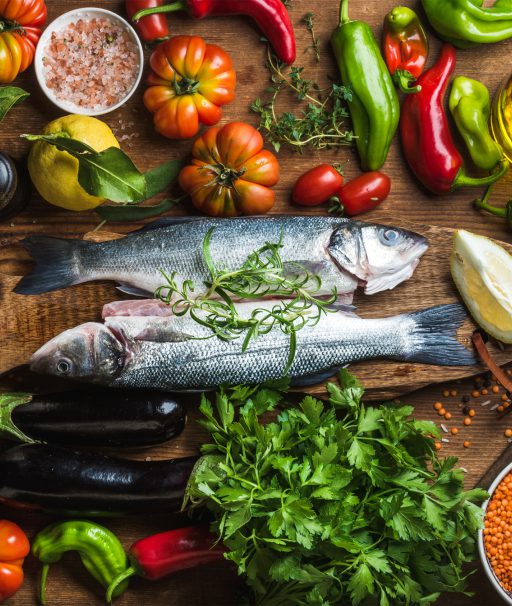Eating The Mediterranean Way
Home / Eating The Mediterranean Way
Eating The Mediterranean Way
The Mediterranean diet is a heart-healthy eating plan based on all the classic foods and beverages that were consumed in the countries bordering the Mediterranean Sea in the 1960s.
The diet is focused on more good fats (monounsaturated and polyunsaturated fats), less bad fats (saturated and trans fats) and overall more fresh than processed food items. It is important to note that the Mediterranean diet is not a weight loss diet but rather a way of eating that can lead to weight loss and overall better health.
Researchers have shown that the Mediterranean diet protects against cardiovascular diseases, cancer, diabetes, Alzheimer’s and Parkinson’s disease. Recent studies show that greater adherence to this Mediterranean diet is associated with a 9% reduction in cardiovascular disease. The diet is thought to have a positive effect on different risk factors for heart disease and stroke such as blood pressure, cholesterol levels, blood sugar control and weight.

Key components of the Mediterranean diet are:
- Eating primarily plant-based foods e.g. fruits, vegetables, whole grains and legumes.
- Replacing butter with healthy fats such as olive oil and canola oil.
- Using herbs and spices instead of salt to flavour foods.
- Replacing red meat with fish and poultry and eating fish at least twice a week.
- Getting plenty of exercise is an integral part of a healthy lifestyle.
Fruit and vegetables
Fruit and vegetables are an important part of your overall healthy eating plan. They are high in vitamins, minerals and fibre and low in fat and calories. Eating a variety of fruits and vegetables may help you control your weight, your blood pressure, and help with lowering your cholesterol.
Nuts and seeds
Nuts and seeds are other important components of the Mediterranean diet. They are high in good fats (poly and monounsaturated fats). However, nuts are also high in calories and therefore should not be taken in large amounts – generally no more than a handful a day. For the best nutrition, avoid candied or honey-roasted and heavily salted nuts.
Healthy fats
The focus of the Mediterranean diet isn’t on limiting total fat consumption, but rather to make wise choices about the types of fat you eat.
The Mediterranean diet features olive oil as the primary source of fat. Olive oil provides monounsaturated fat, which is a type of fat that can help reduce your cholesterol levels when used in place of saturated or trans fats. “Extra-virgin” and “virgin” olive oils are the least processed forms and contain the highest levels of antioxidants, which are good for your heart.
Rapeseed oil is equally as beneficial for your heart health, and it is only a fraction of the cost. Omega-3 fats are another important component of the Mediterranean diet. These fats are found in oily fish such as mackerel, lake trout, herring, sardines, albacore tuna and salmon. Omega-3 fats help lower your cholesterol, decrease blood clotting, improve the health of your blood vessels, and help moderate blood pressure.
The Mediterranean diet encourages fish at least twice a week. Remember fresh, frozen and tinned fish are all equally as good!
Alcohol
There is a myth that red wine is good for preventing heart disease, however, this is not true. All types of alcohol are harmful to health, even in small amounts. If you choose to drink alcohol, limit your intake to 10 standard drinks per week (1 standard drink = 100ml wine, ½ pint beer, 35ml spirit). Try not to have more than 1 or 2 standard drinks in a day.
Putting it all together the Mediterranean diet is a delicious and healthy way to eat. Here are some specific steps to get you started:
- Increase fruit and veg intake (aim for at least 2-3 servings of each per day and remember frozen vegetables are as good as fresh vegetables).
- Switch to whole grains. Switch to whole-grain bread and cereal, and begin to eat more brown rice and wholegrain pasta.
- Snack on nuts. Go for unsalted nuts as a healthy snack. However, limit to one handful per day.
- Avoid butter. Choose a low-fat spread instead of butter. Spread very thinly on bread.
- Spice it up. Season your meals with herbs and spices rather than salt.
- Eat more fish. Eat fish at least twice a week. Fresh, frozen or tinned fish is perfect. Opt for more oily fish like salmon, sardines, trout, mackerel and herring.
- Limit red meat. Limit red meat intake to a maximum of three times per week.
- Try to reduce alcohol intake.